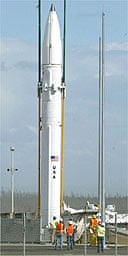Downing Street yesterday confirmed it had asked the US to consider Britain as a possible launching pad for US missile interceptors as part of the Bush administration's proposed "son of Star Wars" anti-ballistic defence scheme.
The government had previously played down such reports and the admission that talks were under way came only after The Economist reported that Tony Blair was lobbying the Bush administration
A Downing Street spokeswoman said: "Discussions with the US have taken place at various levels. Decisions on additional support for the missile defence system are at a very early stage and no decisions have been taken as to whether any element of that system would be based in the UK or where they might be based in the UK. We welcome plans to place further missile defence assets in Europe."
She declined to comment on reports that the prime minister had raised the matter directly with President Bush.
A Ministry of Defence official added: "Poland and the Czech Republic have expressed interest in hosting elements of missile defence. Our request is just to be kept in consideration."
However, David Johnson, the deputy chief of mission of the US embassy in London, said Britain might not be needed. "There may be opportunities for us to talk to other countries but right now we are concentrating on the Czech Republic and on Poland as the primary sites."
The system is intended to create a space-age shield around the US and its allies with an array of interceptor missiles capable of knocking incoming ballistic missiles out of the sky.Critics argue it represents a huge expenditure on unproven technology. The nickname "Son of Star Wars" is a reference to a scheme proposed by Ronald Reagan.
Both Labour backbenchers and the opposition complained that the government had not raised the issue with MPs at any point. It has been suggested the US would want work to begin in 2008 with the anti-missile system in place by 2012. Such a scheme would be controversial and raise the spectre of a return to Greenham Common-style mass peace protest.
Gordon Brown is understood to be aware of the discussions - and the financial implications - but not to have played an active role in them. Several Labour MPs expressed concern that Mr Blair might be attempting to cement Britain's close ties to the US before standing down.
Joan Ruddock, an ex-minister and former chair of CND, said: "This needs a proper consultation. It's not something that the outgoing prime minister should be negotiating with the US in the absence of parliamentary and public debate."
The Labour leadership contender Michael Meacher said: "This has apparently been discussed at prime ministerial level for the past six months when the rest of us knew nothing about it."
Liam Fox, the shadow defence secretary, said: "We have had no details despite asking a lot of questions in Parliament."
He said there were questions about how "applicable and practical" the system was and where it might be deployed. "If the government want to maintain a bipartisan approach to defence, they had better start getting honest with the opposition."
A year ago, Lord Drayson, the minister of defence for procurement, said the government appreciated "the complexity and sensitivity" of the issue and promised "a full debate" if any request to deploy interceptors on British soil was made.
The US has already deployed interceptors in California and Alaska and is looking for a European site. The Bush administration says the system is designed as a shield for the US and its allies against "rogue states" such as North Korea and Iran.
The European site is intended to counter a threat from Iran, but Moscow has viewed it as an attempt to undermine Russia's nuclear deterrent.
The development of the missile defence system has been fraught with technical hurdles but the Ministry of Defence believes the US is making progress.
"The beginnings of a capability are there, but there is scope for improvement as the technology matures," an official said. Andrew Brookes, an aerospace expert and the International Institute for Strategic Studies was blunter. "The system won't work for 10 to 15 years," Mr Brookes said. "They are spending $18bn a year on it and they're not getting it right."
The satellite-aided guidance systems would have to achieve the feat of "getting two bullets to hit each other every time". Meanwhile, the principal threat being considered, Iran, was at least 10 years away of being able to put a nuclear warhead on a missile capable of reaching the US, Mr Brookes argued.
If Britain was chosen as a site for interceptor missiles, it is unclear where they would be sited, as they would be likely to provoke fierce resistance. Analysts suggest US bases such as Lakenheath or Mildenhall in Suffolk could be used.
